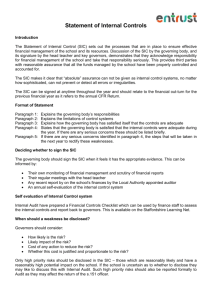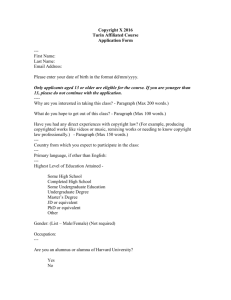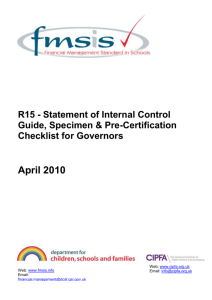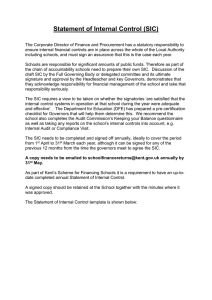Statement for Internal Controls
advertisement
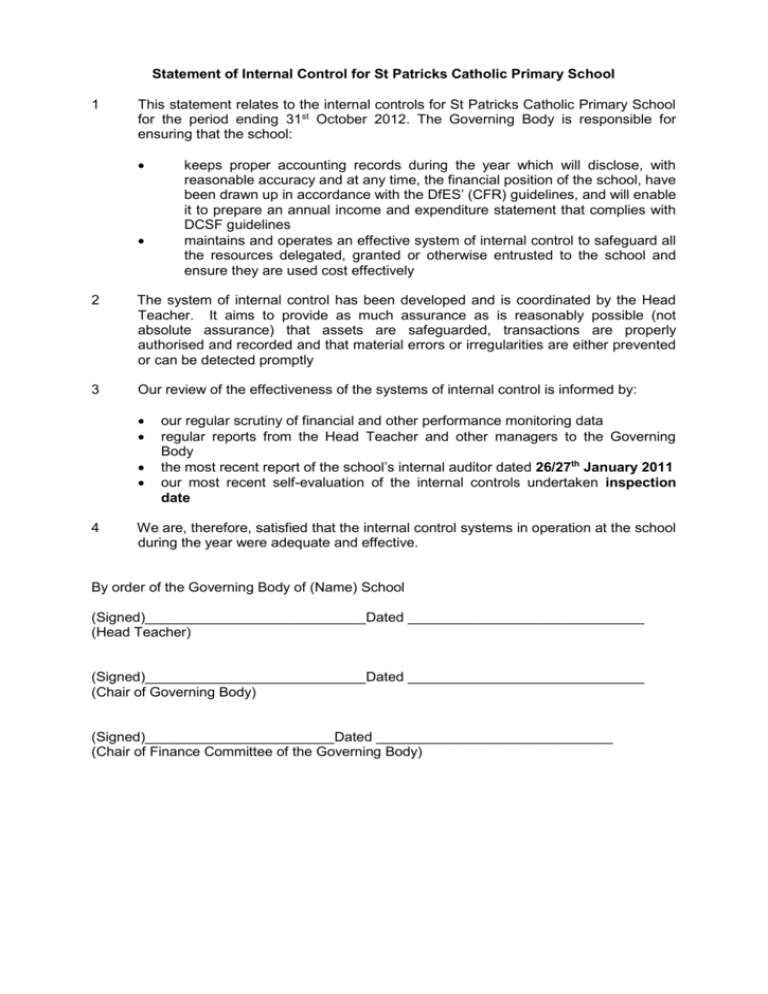
Statement of Internal Control for St Patricks Catholic Primary School 1 This statement relates to the internal controls for St Patricks Catholic Primary School for the period ending 31st October 2012. The Governing Body is responsible for ensuring that the school: keeps proper accounting records during the year which will disclose, with reasonable accuracy and at any time, the financial position of the school, have been drawn up in accordance with the DfES’ (CFR) guidelines, and will enable it to prepare an annual income and expenditure statement that complies with DCSF guidelines maintains and operates an effective system of internal control to safeguard all the resources delegated, granted or otherwise entrusted to the school and ensure they are used cost effectively 2 The system of internal control has been developed and is coordinated by the Head Teacher. It aims to provide as much assurance as is reasonably possible (not absolute assurance) that assets are safeguarded, transactions are properly authorised and recorded and that material errors or irregularities are either prevented or can be detected promptly 3 Our review of the effectiveness of the systems of internal control is informed by: 4 our regular scrutiny of financial and other performance monitoring data regular reports from the Head Teacher and other managers to the Governing Body the most recent report of the school’s internal auditor dated 26/27th January 2011 our most recent self-evaluation of the internal controls undertaken inspection date We are, therefore, satisfied that the internal control systems in operation at the school during the year were adequate and effective. By order of the Governing Body of (Name) School (Signed)____________________________Dated ______________________________ (Head Teacher) (Signed)____________________________Dated ______________________________ (Chair of Governing Body) (Signed)________________________Dated ______________________________ (Chair of Finance Committee of the Governing Body) Statement of Internal Control - Pre-Certification Checklist for Governors The Statement of Internal Control (SIC) is designed to accompany the DCSF Consistent Financial Reporting (CFR) Return and Financial Summary, and so relates to the same completed financial year. The internal controls it refers to are those required as best practice by the Financial Management Standard in Schools (FMSiS). The issues for Governors and the Head Teacher to consider before authorising their representatives to the sign the SIC fall into two categories: Specific actions and more general control processes that should have occurred during the financial year in question; and Specific actions needed after the year end when the CFR Return is available. The questions are split into these two categories for ease of consideration. That consideration is probably best achieved as a group, perhaps at the finance committee meeting that approves the CFR Return, and needs to be formally recorded. The questions are structured so that: A “yes” answer to every question would allow the SIC to be signed without any amendment; and A “no” answer to any question will require either further action or explanation in the SIC. Controls that should have operated during the financial year Question Agreed Yes or No Implication of the Answer Did we set the school budget in line with the priorities detailed in the school development plan either before the beginning of the financial year (1st April) or as soon as possible thereafter? If yes, no action. If no, paragraph 4 should disclose this weakness. Paragraph 5 should explain the steps being taken to ensure next year’s budget is set on time and reflects the school’s priorities. Did we see regular reports on the school’s financial position during the year, did the Head Teacher and School Business Manager answer all the questions raised with them and were we satisfied that materially accurate records have been maintained throughout the year? (Regular in this context would refer to termly reports as a minimum and possibly more frequent in larger schools.) If yes, no action. Did we take appropriate action on all significant matters raised in reports from the internal auditor? If yes, no action. If no, ensure this decision is justified. If, after reflection, it is considered that some action needs to be taken, describe this briefly in paragraph 5. Did we review a risk assessment and taken appropriate steps to manage the risks identified including the introduction of internal controls and/or external insurance cover where required? If yes, no action. If no, the need to conduct a comprehensive risk assessment should be noted in paragraph 4. Paragraph 5 should explain the steps being taken. If no, paragraph 4 should disclose the inadequate base financial records as a weakness. Paragraph 5 should explain the steps being taken to rectify the position. Question Agreed Yes or No Implication of the Answer Control activities required after the end of the financial year Has the Head Teacher confirmed that he/she has seen a reconciliation of the school’s base financial records with the latest CFR Return (either prepared from the school’s own system or by the local authority) and Financial Summary that shows they are: a complete record of the School’s transactions for the year and that the two documents are consistent with each other? based on financial records that have met the requirements of the DfES’ Consistent Financial Reporting (CFR) framework? If yes, no action. Have we received a report from the internal auditor giving us assurance that the systems of internal financial control operated satisfactorily during the year? OR Have we undertaken a thorough selfevaluation of the internal control systems in operation during the year and did not find any weaknesses that needed to be addressed as a high priority? If yes to either question, no action. If no to both questions, either: delay signing the statement until you have received the report or undertaken the self-evaluation OR if the report or the self-evaluation has identified weaknesses that need to be addressed as a high priority, list them at paragraph 4 and briefly explain in paragraph 5, the action planned to rectify them. Are we confident that there are no significant litigation, liabilities or commitments that have arisen after the year-end, and are not referred to or accounted for in the published financial summaries? If yes, no action. If no, consider if the accounts need adjusting in order to be complete, or whether a Contingent Liability or Gain disclosure note should be added and the Local Authority Finance Department informed. Have we been advised that there has been no actual or potential non-compliance with laws, regulations and codes of practice that could reduce the school’s ability to meet its objectives or cause the school to incur a financial loss, and is this supported by our own knowledge of the school and its activities? If yes, no action. If no, to the first question, make arrangements for the Head Teacher to complete/review the reconciliation before the SIC is signed and published. If no to the second question, the noncompliance should be noted at paragraph 4 as a weakness. Paragraph 5 should explain the steps being taken to rectify the position. If no, add the appropriate disclosure notes to the income and expenditure account before it is signed and published. Notes: Given the s151 officer has ultimate responsibility for the internal control systems of the whole authority it will be necessary to report the details of any “No” answers to him or her or more realistically to a representative of the s151 Officer. The completed internal controls self-evaluation should be copied to the Local Authority internal audit section to inform its risk assessment and audit planning processes. The self-evaluation review may not necessarily have been undertaken by all of those signing the SIC, and performing compliance tests of the operational effectiveness of the controls goes beyond the role of Governors. What is important is for the review to inform whether reasonable assurances can be given.
